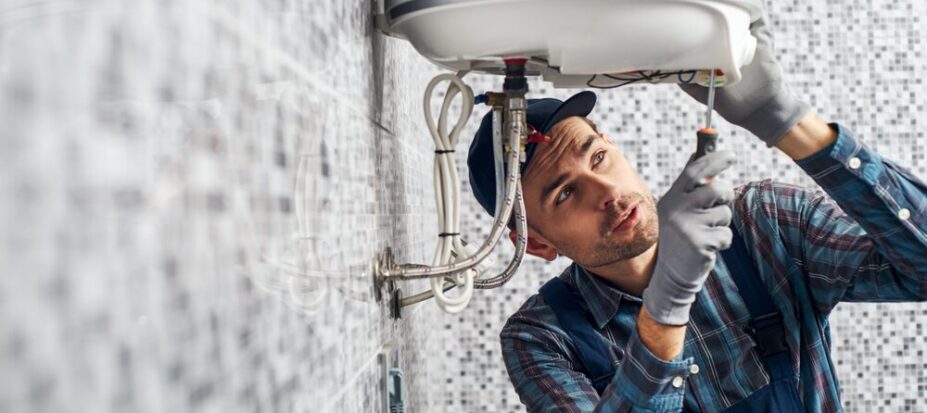As temperatures drop across New Jersey, many homeowners worry if their water heaters can withstand another harsh winter. Preventing issues with your water heater can save you money and headaches later. This article provides tips from HVAC experts on preparing your water heater for winter, determining if you need a replacement, and finding the best New Jersey HVAC contractors to fix any problems.
Don’t let HVAC issues leave your New Jersey home cold this winter. Contact E.J. Stashluk & Sons Inc. at 908.277.6200 immediately to schedule expert furnace repair and ongoing maintenance services that keep your family warm and safe all season.

Do You Know the Signs Your Water Heater Is Failing?
Before winter hits, inspect your water heater to spot any signs it may be nearing the end of its lifespan. Here are a few key things to look for:
-
Rust Around the Tank: Rust indicates corrosion and small leaks that allow oxygen inside to react with the steel tank. These will only grow worse over time. Consider replacing rusty tanks.
-
Strange Sounds: Clanking, rumbling, or popping noises indicate sediment buildup or failing components. Have New Jersey HVAC contractors inspect unusual sounds right away.
-
Lower Water Temperature: If you aren’t getting enough hot water for showers or dishes, your water heater may not be heating water properly. Lower output usually means elements need replacing.
-
Slow Recovery Time: Does your hot water take forever to heat up again after use? Long recovery times signify your water heater is working overtime to keep up with demand.
-
Higher Energy Bills: A spike in energy bills out of nowhere may be due to an inefficient water heater not properly insulating heat. New Jersey HVAC technicians can determine if age or damage is impacting efficiency.
How Can You Prepare Your Water Heater for Winter?
Once you’ve inspected for problems, take a few simple steps to winterize your water heater and prevent issues when the temperatures plummet:
-
Insulate Pipes: Uninsulated pipes allow heat transfer from the hot water lines. Covering them prevents energy waste so more hot water reaches your faucets.
-
Install Heat Tape: Outdoor pipes are even more vulnerable to freezing in winter. Wrap them with special heat tape to maintain circulation and prevent ice blockages.
-
Drain Sediment: Yearly draining removes mineral deposits and debris at the tank bottom. Built-up sediment can lead to overheating elements and damage.
-
Check Pressure Valve: Ensure the T&P valve isn’t dripping or leaking. Drips indicate it may be blocked and unable to release excess tank pressure properly.
-
Replace Anode Rod: This protective rod shields the tank interior from corrosion but wears out over 5-10 years. Replacing extends the overall water heater lifespan.
Warning Signs You Need a New Water Heater
While preventative maintenance helps, there comes a point when repairs and part replacements just delay the inevitable. Here are five clear indicators it’s time to replace your aging or damaged water heater completely:
-
You Have No Hot Water: A total lack of hot water signals something is wrong internally. Whether it’s failed heating elements, leaks, or something else, complete hot water loss means replacement time.
-
Rust Holes are Visible: Once corrosion has eaten entirely through the metal, causing visible holes, the tank integrity is too compromised to salvage. Any leaks also risk flooding damage.
-
Water Heater is Over 10 Years Old: Even if no apparent problems exist, standard tank water heaters reliably last only 8-12 years. Regardless, it’s wise to budget for replacement around the 10-year mark.
-
Damaged Components Can’t Be Repaired: Damaged tank interiors, cracked heat exchangers, or blocked flues may be beyond repair. New Jersey HVAC contractors can assess if replacement parts are even available.
-
Energy Bills Keep Increasing: A new, energy-efficient model may save money in the long run if an aging unit suffers from heavy heat loss and inefficiency. Use a replacement cost vs energy savings calculator to compare.
How Much Does Water Heater Replacement Cost?
In New Jersey, homeowners pay an average of $2,155 to replace a traditional 40-50 gallon tank water heater. However, exact pricing depends on:
-
Type (gas vs electric)
-
Size
-
Energy efficiency rating
-
Additional venting needs
-
Labor & installation
-
Removal & disposal fees
You can also choose tankless water heaters for a higher upfront cost but increased efficiency, lower energy use, and extra hot water capacity over time. Discuss options with New Jersey HVAC contractors.
5 Winter Water Heater Problems in New Jersey Homes
New Jersey winters alternate between freezing temperatures and heavy snowstorms. Both inevitably lead to more water heater repair calls every year when unprepared units fail. Here are 5 of the most common seasonal issues local New Jersey HVAC contractors see:
-
Not Enough Hot Water: Increased demand for showers, laundry, and dishes pushes an aging tank’s limits. Failing heating elements then can’t keep up with winter usage spikes.
-
Leaking Tanks & Pipes: Freezing temperatures make metal tanks and pipes contract. This expands existing corrosion cracks that start leaking heavily.
-
No Hot Water At All: Sediment-blocked pipes, failing thermostats causing control problems, and frozen outdoor lines are just some winter-specific reasons hot water stops flowing.
-
Frozen & Burst Pipes: Uninsulated outdoor pipes withstand only moderate cold before freezing solid and rupturing from expanding ice crystals.
-
Skyrocketing Energy Bills: Running an inefficient water heater on overtime yet still having availability problems leads to high monthly energy costs.
How Can I Prepare for a Winter Emergency?
Frigid temperatures increase the likelihood of a winter water heater emergency. Prepare ahead of time with these tips:
-
Know Who to Call: Program New Jersey HVAC contractors can quickly respond to winter hot water issues in your phone ahead of time.
-
Maintain Accessibility: Don’t stack boxes or household items around your water heater that technicians may need to move or access.
-
Save for Emergency Costs: Budgeting ahead helps pay for repairs or total replacement if your unit fails. Most homeowners spend $500-$1500 fixing winter water heater problems.
-
Keep Spare Blankets & Water: If you lose all hot water, having extra blankets, bottled water for drinking/cooking, and flashlights will keep your family comfortable.
-
Learn to Shut Off Valves: Knowing how to shut off cold water valves, gas lines, and other feed lines prevents extensive water damage if pipes burst.
5 Maintenance Tips to Prevent Winter Water Heater Issues
While you can never prevent all seasonal water heater problems, staying on top of maintenance helps minimize headaches. Follow these vital winter care tips:
-
Flush Sediment Buildup: Letting mineral deposits and debris accumulate raises overheating risks. Flush tanks yearly.
-
Replace Old Heating Elements: As internal electric heating rods wear out, they become less effective at heating water.
-
Check Pipe Insulation: Ensure all hot and cold pipes are thoroughly wrapped and insulated. Add more as needed.
-
Install Pipe Heat Tape: Outdoor pipes especially need special heat tape to maintain water temperatures in the freezing air.
-
Upgrade to High-Efficiency Model: Investing in an ENERGY STAR® certified unit cuts heating costs dramatically during expensive winter months.
Signs You Chose the Wrong New Jersey HVAC Contractors
With so many area HVAC companies to pick from, how can you tell if you chose the wrong service provider? Watch for these red flags:
-
Slow Emergency Response Times: The contractor doesn’t offer 24/7 winter service or takes over 48 hours to schedule boiler repair appointments.
-
Constant Part Delays: You must regularly wait days or weeks for the contractor to order essential heating parts and components.
-
Upselling Unneeded Services: Less ethical companies try upselling expensive replacements when minor repairs resolve your issues.
-
Refusing Small Job: Avoid HVAC providers turning down minor tank flushings, leak repairs, or checkups they consider “not worth their time.”
-
Spotty Technician Performance: Asking multiple crews to come out indicates inconsistent service quality and reliability.
Why Consider Replacing vs Repairing Water Heaters?
When your water heater shows signs of failure, one of the first questions to be answered is whether to repair or entirely replace the unit. There are valid cases to be made for each option:
-
Typically, cheaper upfront cost
-
It makes sense if the damage is minor
-
Extends useful lifespan 3-5 years
Replacing Water Heaters
-
Averting eventual replacement anyway
-
Modern units are much more energy-efficient
-
Longer overall lifespan (over ten years)
-
Advanced temperature controls
-
Larger hot water capacity
Review your budget, usage needs, and expected longevity to decide whether replacement may better suit your home long term. Consult with knowledgeable New Jersey HVAC contractors exploring your options as well.
Should I Choose Gas or Electric Models?
Homeowners looking to replace water heaters must pick between gas and electric models. Consider:
Electric Water Heaters
-
Typically cheaper to purchase
-
Safer indoor operation
-
More installation locations
-
Lower heating capability
Gas Water Heaters
-
Heat water faster
-
Higher capability for peak demands
-
Lower operating costs over time
-
Need proper outdoor ventilation
On average, gas units heat water more affordably despite higher upfront installation expenses. Contact local New Jersey HVAC contractors to see what fits best for your household usage.
Signs You Need Water Heater Repairs
While replacements are necessary once tanks corrode and age too far, many homeowners can also benefit from periodically repairing minor water heater damage that does not warrant complete unit replacement.
Here are six signs to call in New Jersey HVAC contractors for water heater repairs before operational problems worsen:
-
Leaking Valves & Fittings: Joints wearing out over time often leak small amounts. Replacing just the damaged O-rings or fittings fixes many leaks cheaply.
-
Dripping T&P Relief Valve: Corrosion blocking the pressure release valve causes leaking. Removing debris and replacing worn valve seats stops problematic discharges.
-
Rust Accumulation: Flaking exterior rust isn’t initially threatening but can eventually damage insulation or structurally weaken tanks once severe. Having scraped off buys extra years.
-
Odd Sounds: Banging pipes or rumbling tanks indicate sediment buildup. Draining and flushing debris-clogging elements restore proper hot water production at lower costs than replacing heating elements.
-
High Energy Bills: Improving insulation around small leaks or tank exteriors often cuts monthly costs back down to normal. New Jersey HVAC contractors determine what needs explicitly better sealing.
-
Failing Heating Elements: As internal elements corrode with age, replacing these rods lets cheaper repairs bring back function versus buying entirely new water heater tanks.
5 Important Things to Know About Your Home’s Water Heater
To prevent winter problems and make informed repair, replacement, and upgrade decisions, keep these essential water heater operation facts in mind:
-
How Temperature Settings Work: The thermostat gauge controls the internal temperature, not the outgoing water temp. Set between 120°F and 140°F. Higher wastes energy.
-
Hot Water Capacity Varies: Capacity depends on tank size and flow rate. 50-80 gallons suits most families, but customize this based on your usage.
-
Water Chemistry Affects Lifespans: Hard water full of minerals corrodes tanks faster than properly filtered and conditioned supplies. Expect to replace units quicker with untreated water.
-
Electric Models Don’t Last As Long: Electric heating elements fail more often than gas burners. Expect closer to 8-10 years rather than 10-15 years lifespan on electric models.
-
Location Impacts Efficiency: More heat is lost when pumping heated water through uninsulated basement ceilings or attic routes. Consider relocating new installs to the main living floors.
Warning Signs of Water Heater Failure in Winter
Winter weather keeps New Jersey HVAC contractors busy responding to water heater breakdowns. Watch for these signs of impending failure as temperatures drop:
-
Rust Dripping Down Sides: Exterior rust spots likely indicate more considerable unseen internal corrosion you can’t easily observe until outright holes rupture.
-
Increasingly Long Heat Times: If you notice hot water taking longer and longer to heat back up after showers or laundry loads, failing elements may be struggling to keep up.
-
Discolored Water: Rust particles or sediment flakes visibly cloud the hot water, pointing to advanced tank corrosion and worn-out components.
-
Intermittent Hot Water Outages: During peak usage, failing water heaters randomly shutting off temporarily hints that control mechanisms and overloaded heating elements need replacing.
-
Visible Moisture Around Bottom: Wet floors underneath or damp tank surfaces indicate fittings and pipe leaks that tend to expand worse in freezing weather once winter arrives.
Choosing Emergency Repair vs Replacement
As mentioned before, entirely replacing failing water heaters always works better in the long term. Why undergo frequent repairs and pour money into an outdated unit already exceeding expected lifespans? However, in winter emergencies focusing on immediate hot water restoration, homeowners may opt for quicker repairs until conveniently scheduling spring or summer replacements. Prioritize based on:
-
Needed Use Before Replacement: If you can’t go days without hot water until a new heater arrives, repairs are necessary as an interim solution.
-
Annual Operating Costs: Compare repair costs vs replacement savings using newer energy-efficient heaters, especially with cold weather stretching out operational hours.
-
Tank Condition: If severe corrosion compromises integrity despite repairs, lingering safety hazards may make replacements mandatory sooner rather than later.
Frequently Asked Questions About HVAC Issues
Searching “water heater replacement near me” brings up lots of options. Ask these questions before deciding on a service provider:
-
Are Technicians Background Checks?
Choose companies conducting complete background checks to access your home. Check licensing as well.
-
Do You Have Emergency Availability?
Ask about guaranteed response times for winter-specific issues like no hot water, frozen pipes, or failing heating elements.
-
What Winter Maintenance Do You Provide?
A trustworthy company educates you on critical seasonal care services like flushing sediment to proactively avoid problems.
-
Can I See Reviews From Local Customers?
Verify their quality claims by reading the experiences of nearby customers specifically facing water heater issues.
-
Do Technicians Receive Ongoing Training?
Well-trained staff should hold valid certifications from industry groups like NATE and regularly update technical skills.
Key Takeaways on Preparing Water Heaters for Winter
Don’t let New Jersey’s freezing winter weather take you by surprise and leave your household without sufficient hot water. Proactively, you can avoid scrambling emergency calls for failed or frozen water heaters. Remember these winter preparation tips:
-
Inspect tanks now for corrosion and capacity issues that worsen in winter.
-
Winterize vulnerable pipes and valves now before temperatures drop. Insulate all possible lines against freezing.
-
Stay on top of vent clearing, sediment draining, anode rod replacements, and other maintenance directing before usage jumps.
-
Call reliable New Jersey HVAC contractors at the first sign of water flow problems or dropping heat capacity.
-
Compare repair expenses against modern replacement savings to make informed financial decisions. Repairs buy you time. Replacements offer better efficiency and reliability in the long term.
Don’t let HVAC issues leave your New Jersey home cold this winter. Contact E.J. Stashluk & Sons Inc. at 908.277.6200 immediately to schedule expert HVAC repair and ongoing maintenance services that keep your family warm and safe all season.




